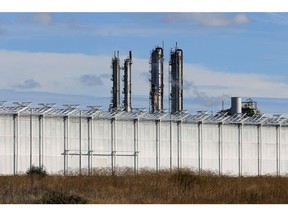Article content
(Bloomberg) — The Belgian brewer of Delirium Tremens beer is facing a real risk of halting production for the first time in more than a century as Europe’s energy crisis creates unexpected ripple effects across the region.
The Belgian brewer of Delirium Tremens beer is facing a real risk of halting production for the first time in more than a century as Europe’s energy crisis creates unexpected ripple effects across the region.

(Bloomberg) — The Belgian brewer of Delirium Tremens beer is facing a real risk of halting production for the first time in more than a century as Europe’s energy crisis creates unexpected ripple effects across the region.
Story continues below
From German tomatoes to Swedish bread, Russia’s squeeze on gas supplies is starting to hit sectors well beyond utilities and energy-intensive industries. The spillover on food and drink supplies will likely intensify as temperatures drop and households require heating, forcing businesses and consumers into tough decisions.
Brewery Huyghe, located in the Belgian village of Melle, considered shutting production because of a 13-fold surge in the price of liquid carbon-dioxide, which it uses to make beers bubbly. It’s hoping a court, which is expected to rule on Wednesday, will thwart its supplier’s force majeure.
“I have enough CO2 to last me until Tuesday,” Alain De Laet, owner of the family-run company, said by phone last week as he searched for a last-minute alternative. “I may need to stop production until I find a Plan B, which would be the first time since 1906.”
Story continues below
The European Union is trying to stem the crisis caused by Russia’s gas cuts, which last year supplied about 40% of the bloc’s demand for the fuel. Commission President Ursula von der Leyen on Wednesday is set to propose a mandatory target to cut power use — a step toward rationing — along with measures to funnel energy-company profits to struggling consumers.
Read more: Scale of Europe’s Energy Turmoil Exposed in Frenzied Crisis Week
The Belgian brewery’s woes were triggered by a chain of misfortunes that illustrate how interconnected Europe’s economy is. Norwegian fertilizer giant Yara International ASA halted ammonia output at a plant in the Netherlands. That in turn hit Huyghe’s supplier Nippon Gases, which demanded 3,350 euros ($3,398) a ton for CO2 instead of 250 euros previously.
Story continues below
“Currently running production based on gas in Europe is not profitable,” Tiffanie Stephani, Yara’s vice president of European government relations, said via email. “We continue to monitor the situation and adapt our production.”
Nippon declined to comment citing the ongoing court case.
Huyghe isn’t alone. Carlsberg A/S said it may need to “significantly reduce” or halt beer production in Poland due to a shortage of liquid CO2. A handful of other Belgian brewers are also affected by the issue, and concerns over contagion are growing.
“A couple of months ago, the industry worked like a Swiss watch,” said Krishan Maudgal, head of the Belgian Brewers Association. “Because of the new situation with rising gas prices, it has cascaded down the value chain.”
Story continues below
Ammonia, which is produced with natural gas, has been hard hit by the price surge sparked by Russia’s move to slash gas deliveries in retaliation over sanctions related to its invasion of Ukraine. A wave of shutdowns has left at least half of the region’s capacity offline, creating a crunch for fertilizer but also CO2 — a byproduct of the process.
Read more: Eiffel Tower Lights to Turn Off Earlier to Lower Power Use
Carbon dioxide is a vital part of the food industry. It’s used to stun livestock for slaughter, as well as in packaging to extend shelf life and for dry ice to keep items frozen during transport.
British online grocery service Ocado Group Plc said on Tuesday that increased costs for things like dry ice and energy will likely weigh on profits in the fourth quarter, while shoppers tighten their purse strings. The combination signals how difficult it will be for companies to pass on higher expenses as households struggle to fulfill basic needs.
Story continues below
For Wittenberg Gemuese GmbH, the disruption of ammonia production has also meant a loss of the heating and hot water needed to operate its greenhouses.
The German grower of tomatoes, strawberries and peppers relies on SKW Piesteritz GmbH for heat as well as CO2, but was left stranded when Germany’s biggest producer of ammonia and urea halted output last week.
“Without heating, nothing works here,” said Kevin van IJperen, manager of the facility, which is nearly three times as big as the Pentagon. “We were still lucky as the temperatures were mild in the last week. Had this happened later in the year, we would have had huge losses.”
The outage at SKW, which is in talks over a government bailout, poses other risks for Germany’s economy. The company covers about 40% of Germany’s demand for AdBlue, an additive used to make the exhaust of diesel vehicles less harmful. A shortage could force freight trucks off the road.
Story continues below
In Sweden, Pagen, one the country’s biggest bakeries, joined other food producers to warn about risks to food supply from surging energy costs and the risks of blackouts.
A one-second electricity disruption in June impacted Pagen’s production for four weeks, head of communications and sustainability Berith Apelgren told local media, adding that recurring outages would be “mind boggling.”
Back in Belgium, Prime Minister Alexander De Croo has warned that Europe’s economy risks a “full stop” from a domino effect caused by the energy crisis.
“That’s why I think that interventions in the gas market are the core thing,” he said in an interview. “If you do that right a lot of the other things are actually less important, because that’s the driving element.”
Story continues below